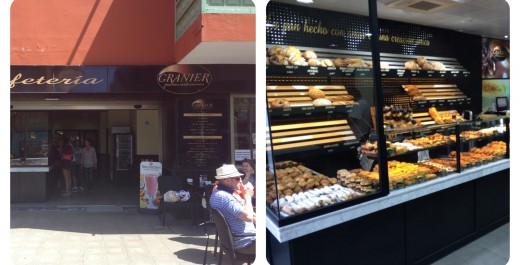25 Jun

When you travel and spend some more time in one place you start creating local routines and habits. It usually happens when you feel comfortable and “at home” in a new place. So pretty fast me and my German and Scottish friends found ourselves returning to the same bakery, Cafetería Granier, in the old-town end at the main street in Corralejo, for coffee and either a sandwich or something sweet. They have wonderful sugary pastries filled with vanilla cream or chocolate, crispy croissants, bocadillo sandwiches made from freshly baked bread with chorizo or jamon serrano, and they make really good cafe con leche!
So almost every day we stopped by Granier when the coffee craving or doughnut cravings grew unbearable. There were three spanish women working there during the weeks and soon we started to recognize them and they started to recognize us. And every time we ordered we spoke only spanish with each other. This is also an essential part of learning a language; practicing spanish in real life situations and sticking to speaking only spanish even if you don’t yet have the right words for everything. The girls in the bakery were very patient with us and soon we started small talking about what we had been doing that day and that we were students of a combined spanish and surfing programme in Corralejo.
By the end of my second week I experienced a moment of revelation in the bakery. We had been studying two different forms of past tenses in spanish. How to explain what you had done or what you used to do, learning the differences when to use which past tense. Well, I thought my concentration and patience with grammar had been a bit poor during class (or it might just have been due to sun stroke or too much water in my ears…) BUT suddenly I was speaking spanish like a native with one of the more talkative bakery girls, and she was telling me about her travels and about her son and family, and as I listened to her I recognized all these past tenses and how she used them in different formulations and managed to use them also as I told her about Finland and my travels. And we were actually talking for a long time!
When I came back to the beach where my friends were waiting they wondered what took me so long, and I proudly explained that I had experienced a sudden transformation into the hiding latin version of myself and got stuck in a lively spanish conversation.
But in the process of learning these moments of idiomatic super powers are not constant. By the next day the verbal flow had passed and I was back at rehearsing and repeating conjugations of verbs in past tenses. BUT at least I know now that I have internalized this grammar in some way and it can pop up at any time again. Like in a bakery.
By Monica Gren
